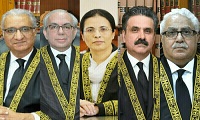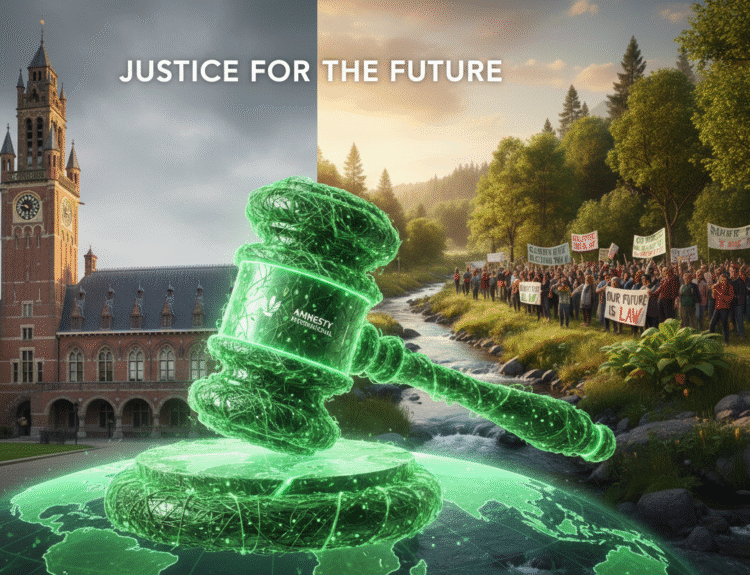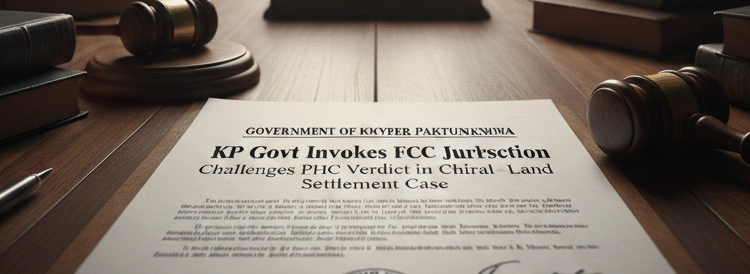While announcing verdict in response to pleas questioning civilians trial before military tribunals in aftermath of nationwide unrest on May 09, the top court Monday declared the proceedings against commoners in military courts unconstitutional.
A five-member bench of the Supreme Court, headed by Justice Ejazul Ahsan and comprising Justices Munib Akhtar, Yayha Afridi, Sayyed Mazahar Ali Akbar Naqvi and Ayesha A. Malik heard identical petitions in the matter.
The apex court announced its short verdict after reserving its decision following proceedings in the case earlier today on a set of petitions questioning the legitimacy of trying civilians in military courts. The court, by a majority of 4 to 1, has held that the trial of civilians under Section 2 D (i) (ii) of the Army Act is unconstitutional. The five-member bench unanimously declared that civilians would be tried under ordinary criminal law.
Justice Yahya Afridi reserved judgement on the validity of Section 2 D (i) (ii). “Without prejudice to the generality of the foregoing the trials of civilians and accused persons, being around 103 persons who were identified in the list provided to the Court by the learned Attorney General for Pakistan by way of CMA No.5327 of 2023 in Constitution Petition No.24 of 2023 and all other persons who are now or may at any time be similarly placed in relation to the events arising from and out of 9th and 10th May, 2023 shall be tried by Criminal Courts of competent jurisdiction established under the ordinary and / or special law of the land in relation to such offences of which they may stand accused,” read the written order.
Earlier, during this year executives and army declared that accused persons who were involved in attacking army installations in nationwide protests on May 09 in response to ousted prime minister Imran Khan’s brief arrest would be tried in military courts.
It has been reported that the announcement faced widespread criticism from within Pakistan and rights organizations globally because of their secretive nature and their existence alongside a functioning civilian legal system.
“Today the Supreme Court of Pakistan has issued a very important verdict in a very important case,” Atizaz Ahsan, a veteran senior lawyer and one of the petitioners of the case expressed while taking to journalists after pronouncement of the verdict. He added saying, “The Supreme Court has proven that supremacy of law and the constitution would be upheld.”
Ahsan further said through its decision, Pakistan’s top court had sent a clear message to all institutions in the country that no one is above the law. “We were against the trial of civilians by military courts,” he said. “We argued against it and we also struggled against it.”
A six-member bench including former Chief Justice Umar Ata Bandial had been adjudicating the pleas since June. However, after Bandial’s retirement, the bench was reduced to five judges. In September, incumbent Chief Justice Qazi Faez Isa was elevated to the position as top judge of the Supreme Court. His appointment garnered nationwide interest given his reputation as a maverick judge and his past hard-hitting judgments. During a hearing on June 27, the federal government had assured the court that a formal trial had not yet commenced against as many as 102 individuals held by military authorities in connection with the May 09 violent protests.
Pakistan’s Army Act of 1952 established military courts primarily to try members of the military or enemies of the state. Civilians can only be tried under a federal government order. Civilians accused of offenses such as waging war against the armed forces or law enforcement agencies, or attacking military installations or inciting mutiny, can be tried at military courts.
Military courts operate under a separate system from the civilian legal system and are run by military officers. The judges are also military personnel and cases are tried at military installations. Trials are closed to outsiders whereas no media presence is allowed, it has been learnt.
Anyone tried under the Army Act has the right to defend themselves and a counsel of their choice. There is no right to appeal but individuals can challenge the question of jurisdiction in high courts and the Supreme Court.
SC Declares Military Trials of Civilians for May 09 Unconstitutional





